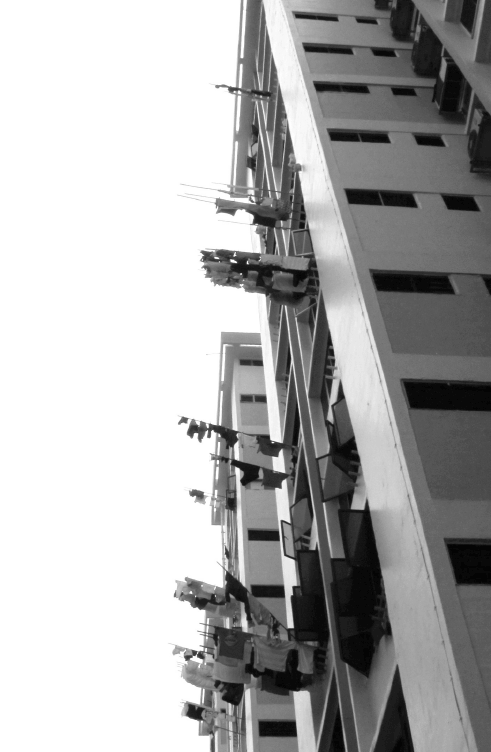If I Could Tell You (15 page)
Read If I Could Tell You Online
Authors: Lee-Jing Jing

Found out that I what? I asked Ma afterwards, but she just shook her head and went back to washing the worms and dirt out of the vegetables as if she hadn’t heard me, as if I wasn’t even there.
I LEFT Ma alone for a few days. I thought she must be really tired, sleeping like that. Like the time after my father died. She slept for a long time. Days and days. My father’s sisters came over every day to bring me food and wash the things in the sink, then they sat around, stinking up the room with their cigarette smoke, laughing behind their hands at something that was happening on television. This time, while Ma slept, I made my own meals of bread and
kaya
or brought warm food back home from the coffee shop. I couldn’t cook since Ma didn’t allow me near the stove, usually, unless she was there and said I could help. Even then it was just to stir things in pots and ladle soup into a bowl. I ate at the table sitting down or near the kitchen window, standing up. I knocked on her door at mealtimes and still she wouldn’t come out. It never occurred to me that something was wrong until the third day and even then, I couldn’t bear to think about it. I thought about my father — how good it would be if he were still around; he could do this. Or the sister who was given away and gone; she might know what to do. When I finally picked up the phone, I dialled the only number I knew, printed in bold on the Chinese doctor’s name card. Ma kept it by the phone just in case. The only thing I could say to the person who picked up was, this is Ah Tee, I said. Help.
I WENT in to work right after, still feeling the grit and dust of my mother’s bones on my skin. The way the pieces of her fit in my palm. I was the only one doing it, sifting through her ashes. There was no one else. Again I thought of the long-gone sister, again I thought of her and all the ways I could contact her but really, couldn’t. It would be impossible. I stood there sifting through the bits of my mother, until they said it was okay, that was enough. It would all go into an urn. She would be at peace, living in the temple, they said.
I went back to work that same day. It took two different buses to get from the temple back home but it was still light when I got back. There was nothing else for me to do but work. Boss stared at me as I walked into the coffee shop, then he nodded. Table four, he said, take their orders and, oh, that doctor from the Chinese clinic, he was here asking about you. I gave him your home number, he might call, Boss said and went back to the coffeepot, taking a large spoon and giving the liquid inside a good stir.
The phone rang twice that night. I knew it was the doctor but I couldn’t bring myself to take the call. I tried to imagine what he might say. Maybe something about my mother, the way he had found her that day when he came over. He had put his handkerchief over his nose and mouth when he got closer to her room and when he came out, he couldn’t look at me. My father had been the same. The last time I saw him was at the hospital. It was the first time I had travelled so far away from home. The ride took twenty-five minutes in a taxi. Any other way would take too long, Ma said. It was the last time I saw my father but I didn’t know it then. He was thin, pale in his face even though he had always been dark. The hollow in his neck was leaping, as if he was swallowing or trying to quench a thirst and I couldn’t keep my eyes off his neck, the etched skin on it. But the moment I said Pa, the moment the word came out of my mouth, he turned away. Spent the hour with his face away from me, from the window, staring out at the curtained off area on his left.
The phone rang a few times the next day, also in the days after that. I thought about what the doctor might say to me if I picked up. Maybe something about my mother. Or maybe the thing that he mentioned during her funeral, about me going to live in a Home. It might be better for me, he said. But I couldn’t imagine that or what it could mean. I couldn’t imagine anything that could help.
I sat and waited in the weeks after. It was the only thing I could do. I waited until I couldn’t anymore, after hoping things would get better, would get easier, somehow, and I would be able to do it — put everything we owned into the boxes and bring them all to the new place. Except I didn’t know how. I started with the things that stuck out, like the radio from Ma’s room, the framed, black and white photo of my father on the altar, I put those in the box first. Then I went and looked in her cupboard. Her clothes, old things I had never seen her wearing, also things that I had seen her wearing a hundred times. And bedsheets, and folded up blocks of cloth that she talked about bringing to the tailor but never did. Then the phone rang, a sound I hadn’t heard in so many days that I first thought it was coming from next door. It took me a few seconds to realise that it was coming from our living room. I ignored it, took everything out of the box again and put them back in the cupboard. It didn’t seem right, taking Ma’s things like that. So I put them all back into their proper places and went out of the room, made sure that I closed the door properly behind me. The phone stopped ringing as soon as I did that.
IN the end, I left everything in its place. If someone should come in here to look for us, me and my mother, they would find a home. There would be rice in a bucket, below where the sauces and oils are. There would be food in the fridge and freezer, waiting to be cooked. Even money, if that is what they are looking for, some few months’ worth of salary from Boss. Somebody would find all that. And all the other little things I don’t usually think about. The broom my mother always swept with, even though it had to be fixed again and again throughout the years. The stove that sings a high-pitched hum whenever someone lights it up. When they find it all, I would be safe. There would be traces of me, at least, and at least, the last thing I touched would be known and familiar. The last thing I touched would be home.

I’m grateful to the National Arts Council of Singapore for awarding a generous grant to the publication of this novella, and to the team at Marshall Cavendish, in particular the editor, Lee Mei Lin, for their hard work.
To Ioanna Mavrou and Amy Alexander for their advice and unending support. To Isaac Sim, Cheryl Goh and Jacinta Kwang for having been there from the start.
To Marco for telling me time and again that this was possible.
 AUTHOR
AUTHORLee Jing-Jing was born in Singapore in 1985. She grew up in a flat much like the ones described in
If I Could Tell You
.